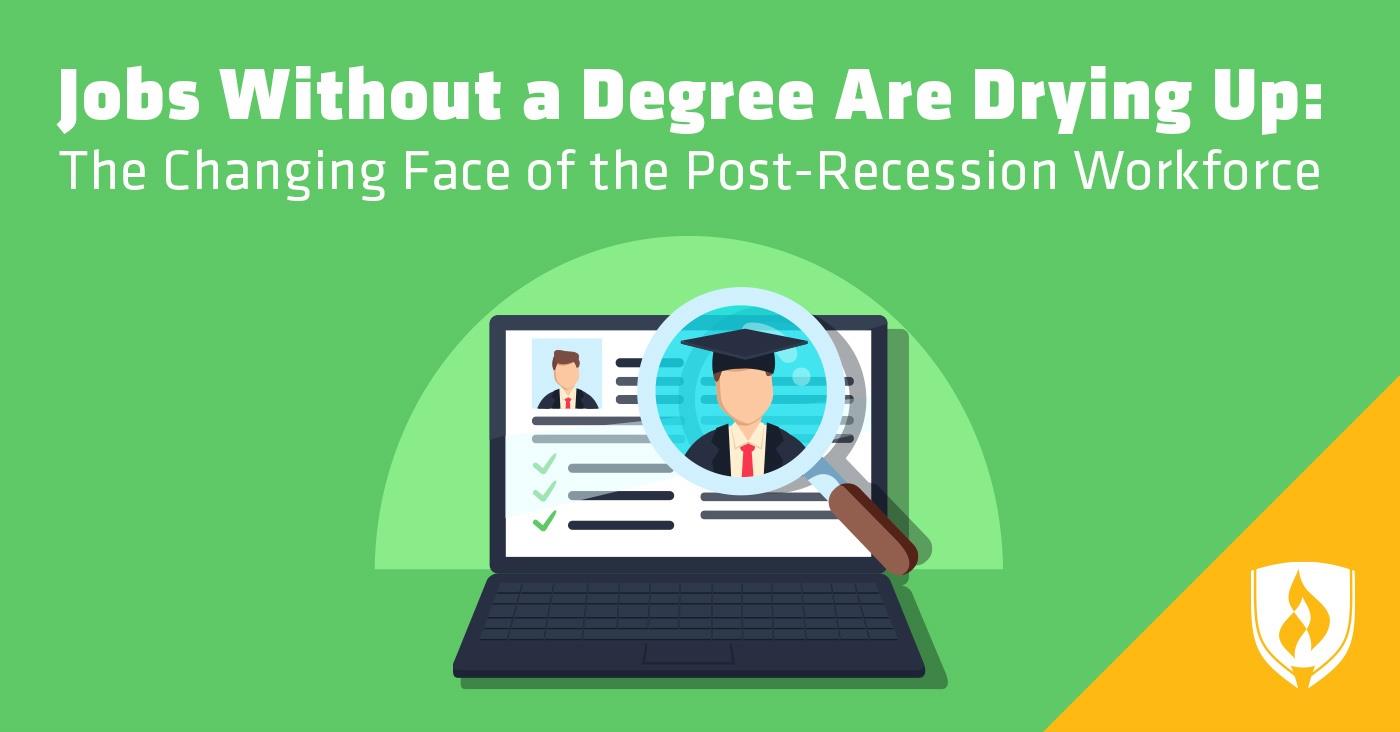Jobs Without a Degree Are Drying Up: The Changing Face of the Post-Recession Workforce
By Ashley Brooks on 03/01/2019

Not long ago, you decided to leave your dead-end job and pursue a real career you’re passionate about. Now it’s hard not to get discouraged as you scroll through one job listing after another with the same requirement: a relevant college degree. Aren’t you qualified for any of the careers that pique your interest with just a high school education?
You’re not imagining the lack of jobs for high school graduates. A study from Georgetown University’s Center on Education and the Workforce (CEW) reports that total employment grew 31 percent from 1989 to 2016, but the number of jobs for workers without a college education actually declined 13 percent over that same time period.1
The data doesn’t lie: Jobs without a degree are hard to come by. You need all the facts if you’re going to make an informed decision about the next step in your career path. Before you settle for an unfulfilling job that doesn’t suit your interests, you’ll want to at least take a look at these expert opinions on the changing face of the post-recession workforce.
How the Great Recession changed America’s job market
You probably remember panicked news stories about the economy during the Great Recession, the prolonged economic downturn, which officially lasted from December 2007 to June 2009. It all began when the housing bubble burst, which set off a chain reaction of reduced consumer spending, stock market drops, fewer business investments and extreme job loss. During those two years, more than 8.4 million jobs were lost, according to Economic Policy Institute.
Nearly a decade has passed, yet job-seekers are still feeling the recession’s lingering effects. The State of Working America estimates that it will be well into the 2020s before the U.S. workforce recovers all the jobs lost in the recession. Unfortunately, many of those new jobs are only up for grabs to college graduates.
The CEW found that 11.5 million of the 11.6 million jobs created in the recovery have gone to workers with at least some college education. In 2016, for the first time ever, workers with a Bachelor’s degree or higher made up more of the workforce than those without a college education.1
These sobering facts point to undeniable changes in the landscape of America’s workforce. We spoke to experts who make hiring decisions every day to uncover why degree-holders have an edge and how employers’ hiring practices are changing the future of the labor market.
Why college graduates have an advantage
More than ever before, the American job market favors applicants with a college degree. Keith Johnstone, head of marketing at Peak Sales Recruiting, attributes this change to the shift from an industrial-based to a technology-based economy—a transition that took place largely during the nation’s recovery from the Great Recession.
“Employers [used] the recession as an opportunity to fire workers and invest in labor-saving machines,” according to an article in The Atlantic. As the economy recovered, this resulted in fewer jobs for workers who don’t hold a degree. Essentially, tight economic times led businesses to seek out savings opportunities like automation—and many of those opportunities had a negative impact on the job prospects of lower-skilled workers.
The Economic and Statistics Administration (ESA) shares that employment in STEM occupations grew much faster than employment in other industries over the past decade, with STEM jobs seeing 24.4 percent growth compared to four percent in non-STEM jobs. College degrees play a role here as well, with the ESA reporting that “Nearly three-quarters of STEM workers have at least a college degree, compared to just over one-third of non-STEM workers.”2
Job seekers are feeling the pressure as the country turns away from industrial manufacturing jobs that often didn’t require a degree. “When you examine the jobs within tech, employers are looking for candidates who possess a specific set of skills, experiences and competencies that are usually mastered in a college or university program,” Johnstone says.
Even in non-tech jobs, many employers believe a college degree gives job seekers an advantage. “When an employer sees that someone holds a degree, right off the bat, they can see that this person has some level of commitment,” says Nate Masterson, marketing manager for Maple Holistics. “If they hold a relevant degree to the job they are applying for, it shows a commitment to their mission and possible vision for the future of their position.”
Education: The future of our nation’s workforce
Our experts agree that companies across the nation are recognizing continuing education as the key to staying relevant in a global economy. “Ongoing education is becoming a greater trend in industry today regardless,” Masterson says.
Johnstone agrees, saying, “World-class employers realize that in order to compete and to retain their best people, they must be investing in training and education programs.” On-the-job training is still very much a part of America’s workforce in this respect—but that doesn’t mean you can write off getting a degree just yet.
Companies realize that they “Could be training a non-college grad in basic procedure, or they could be investing in a college grad to build on their preexisting education,” Masterson points out. With employers valuing education more than ever, some companies would rather build on the expertise of degree-holders than start from scratch with a high school graduate who lacks specialized training.
Should you get a degree?
You’re the only one who can decide if earning a degree is the right path for you, but there are several factors to consider when weighing your options. Many employers feel that the additional earning potential and character development a college education provides makes it a worthwhile step for job seekers.
“There is no debate about whether it's in a candidate’s best interest to acquire a degree,” Johnstone says. He cites the soft skills students gain in higher education, such as time management and critical thinking, as essential qualities for workers in any industry. Masterson agrees, saying, “Workplaces are really making a shift into transferable skills, so dig deep in every experience, learn as much as you can and learn how to express it.”
There’s also the stability to consider. The Bureau of Labor Statistics reports that (in 2015) those with a Bachelor’s degree experienced far lower unemployment rates: 2.8 percent compared to 5.4 percent for those without a degree.3
Your time is now
You’re not imagining the lack of jobs for high school graduates. Now that you’ve got a clearer view of the challenges facing workers post-recession, you might decide that going to college is the best way to boost your future career options. After all, careers without a college degree aren't as plentiful as you may have thought.
Just because you decide to earn a degree doesn’t mean you have to devote four years of your time. Learn how you can expedite your education in our article, “How to Finish College Faster: 6 Ways to Get on with “Real Life” Sooner.”
1Source: Georgetown University Center on Education and the Workforce, (America’s Divided Recovery: College Haves and Have-Nots).
2Economics & Statistics Administration, U.S. Department of Commerce, STEM Jobs: 2017 Update.
3Bureau of Labor Statistics, U.S. Department of Labor, Data on Display: Education Matters [information accessed February, 2019] https://www.bls.gov/careeroutlook/2016/data-on-display/education-matters.htm. Salary data represents national, averaged earnings and includes workers at all levels of experience. This data does not represent starting salaries and employment conditions in your area may vary.




